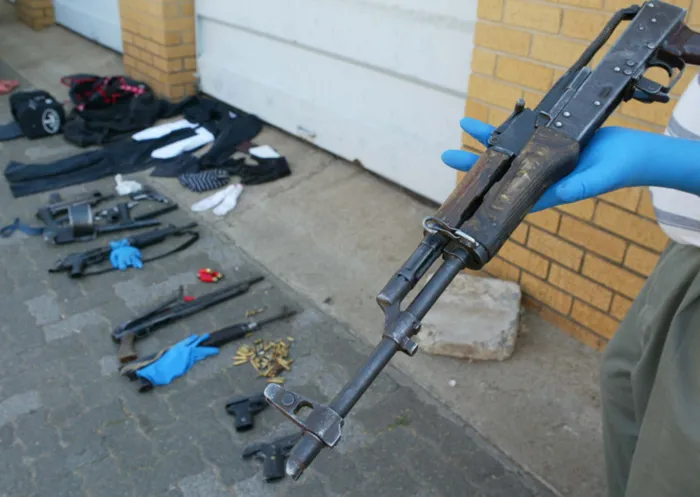SA’s arms link to Libya

A former SA National Defence Force member, accused of keeping an illegal arms cache in his home, was granted bail by the Springs Regional Court. Photo: Independent Newspapers A former SA National Defence Force member, accused of keeping an illegal arms cache in his home, was granted bail by the Springs Regional Court. Photo: Independent Newspapers
As details of South Africa’s sale of arms to Libyan leader Muammar Gaddafi emerge, the South African government has said it supports the suspension of Libya from the UN Human Rights Council.
“South Africa is very gravely concerned about the situation in Libya,” said Sangqu Baso Sangqu, South Africa’s ambassador to the UN yesterday.
“South Africa will work with the council to ensure that everything is done to make the authorities in Libya stop their maiming and killing of the Libyan people. Everything must be done to heed the will of the Libyan people.”
South African diplomats in New York were yesterday mulling over how to vote as the UN Security Council negotiated a draft resolution proposed by Western powers that would impose an arms embargo and targeted sanctions on Libyan leaders in an effort to halt the killing of protesters.
The sanctions were given impetus by a dramatic statement by Libya’s ambassador to the UN, Abdurrahman Mohamed Shalgham, who supported the measures. And in Pretoria, Libyan ambassador Abdullar Alzubedi also issued an extraordinary statement condemning the killing of unarmed civilians protesters by Libyan security forces.
The Department of Defence has confirmed that it spearheaded a marketing campaign for 72 G6 artillery tanks and other weaponry to Gaddafi last year, but the parastatal arms manufacturer has denied any sales actually took place.
But the chairman of the cabinet’s national conventional arms control committee, Justice Minister Jeff Radebe, has tacitly admitted the sale of an earlier consignment of sniper rifles by another company – allegedly late last year.
“At the time when the transaction was concluded with Libya, there was no evidence available to the effect that there would be any political unrest in that country,” Radebe said. “This extends to the region – North Africa and parts of the Middle East. Similarly, there was no evidence that if political instability was to occur, that it would be violent in Libya or in any of the countries with which arms trade had been concluded.”
Meanwhile in Misrata, about 150km east of the Tripoli, the Libyan capital, helicopter-borne mercenaries fighting for Gaddafi fired on protesters attending a funeral, a witness said.
As the witness spoke the sound of heavy weapons fire was audible in the background.
After being airlifted to Misrata the mercenaries opened fire on the relatives of the victims who were about to enter a mosque, he said, adding that the mercenaries also shot at a building that housed an opposition-run radio station.
On Friday, a Misrata resident said the city had been deserted by Gaddafi loyalists but that clashes at a local air base claimed the lives of 30 rebels.
For several days Misrata has been the scene of heavy fighting between protesters and Gaddafi loyalists “supported by African mercenaries”, according to several witnesses.
In Tripoli Gaddafi’s forces were yesterday arming civilian supporters to set up checkpoints, and roving patrols to control movement and quash dissent as Gaddafi’s grip on power looked increasingly tenuous.
Mediterranean ports overflowed with thousands of evacuees from the country yesterday and thousands more foreigners were still scrambling to flee by sea, air or land.
The sheer numbers of foreigners leaving Libya has been staggering. As of yesterday, at least 16 000 Chinese, 15 000 Turks and 1 400 Italians had been evacuated, most of them working in the construction and oil industries.
UN secretary general Ban Ki-moon told the Security Council that some 22 000 people had fled across the Libyan border to Tunisia and another 15 000 had crossed the border into Egypt.
In Tripoli, many residents remained in their homes, terrified of bands of armed men running checkpoints and patrolling the city.
Most shops were closed and long lines of people venturing from their homes for supplies formed at bakeries.
Crude oil shipments from Libya, the 12th-largest exporter, have all but stopped. – Reuters, Sapa-AP amd Weekend Argus